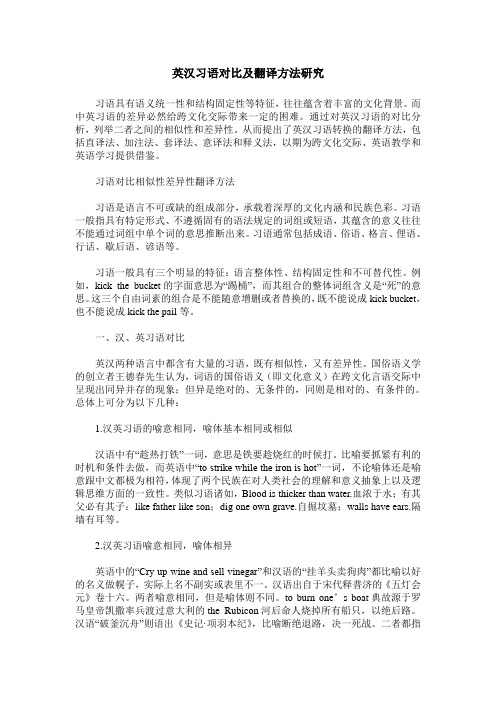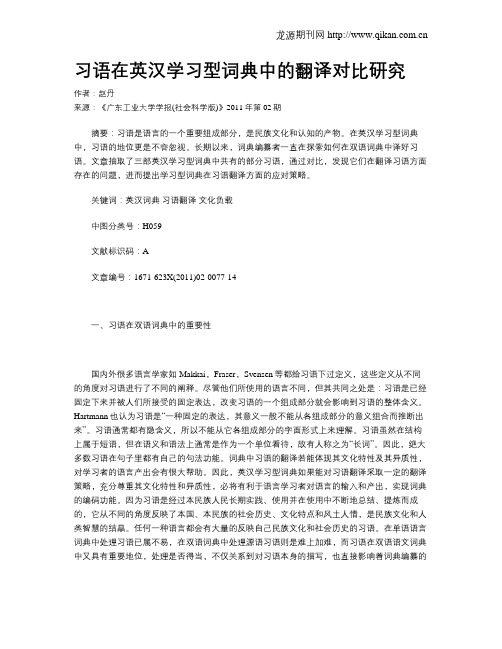陈霭盈 英汉习语的比较
- 格式:docx
- 大小:35.53 KB
- 文档页数:14

英汉写作修辞对比(第二版)作英文写作中的修辞技巧通常比中文写作中的要具有更多的优势。
通常来说,中文写作采用的是简单、直接、平凡的语言表达,而英文写作则要求更复杂、多变且富有故事性的语言表达;从写作字迹看,英文拥有更多的修辞手段,可以形象地表达作者的思想和观点,并把自己的内容表达得更加清楚简洁;此外,英文写作还有其正式性和文学性的特质,而中文写作则朴素地列出事实。
另外,尽管两种语言都有共同的修辞手段,比如比喻、排比,但是英文运用修辞技巧的方式更多,更有深度。
首先,英文写作有更精确的修辞。
在英语思维角度来看,英文写作可以更准确地表达自己的观点,通过把修辞手段灵活地运用,比如拟人、比喻、排比、押韵等;并且,在英文写作句法上,它可以灵活使用复句、定语从句、名词性从句等,以此可以把文字文字写得更活跃。
例如:He knew that success would not come overnight, but rather with patience, dedication, and hard work.其次,英文写作重用修辞的方式远与中文相比,英文的句子内部更加精妙,更有深度与张力。
最典型的比喻词汇,如“银色的月光”、“芳香的花儿”、“清澈的湖水”等等,可以让英文的写作雅致、深邃,也能丰富表达的色彩,让读者有另一种更深刻的沉浸体验。
例如:The night was so dark that the stars seemed to glow like fireflies in the sky, and the air was fragrant with the smell of the flowers in the garden.英文写作中拟人手法是人们比较熟悉的一种修辞手段,可以比喻事物,使文章变得活泼、生动。
它可以帮助写作者把让读者更容易把握要点,更好地理解文字内容,或让文字变得更有诗意。
例如:The moon smiled down on the valley, its gentle light illuminating the winding paths like a beacon.最后,从写作形式来看,英文写作更加富有张力和文学气息,写出来的内容更有一定的文采,可激发读者不一样的思想感受。

英汉习语对比及翻译方法研究习语具有语义统一性和结构固定性等特征,往往蕴含着丰富的文化背景。
而中英习语的差异必然给跨文化交际带来一定的困难。
通过对英汉习语的对比分析,列举二者之间的相似性和差异性。
从而提出了英汉习语转换的翻译方法,包括直译法、加注法、套译法、意译法和释义法,以期为跨文化交际、英语教学和英语学习提供借鉴。
习语对比相似性差异性翻译方法习语是语言不可或缺的组成部分,承载着深厚的文化内涵和民族色彩。
习语一般指具有特定形式、不遵循固有的语法规定的词组或短语,其蕴含的意义往往不能通过词组中单个词的意思推断出来。
习语通常包括成语、俗语、格言、俚语、行话、歇后语、谚语等。
习语一般具有三个明显的特征:语言整体性、结构固定性和不可替代性。
例如,kick the bucket的字面意思为“踢桶”,而其组合的整体词组含义是“死”的意思。
这三个自由词素的组合是不能随意增删或者替换的,既不能说成kick bucket,也不能说成kick the pail等。
一、汉、英习语对比英汉两种语言中都含有大量的习语,既有相似性,又有差异性。
国俗语义学的创立者王德春先生认为,词语的国俗语义(即文化意义)在跨文化言语交际中呈现出同异并存的现象;但异是绝对的、无条件的,同则是相对的、有条件的。
总体上可分为以下几种:1.汉英习语的喻意相同,喻体基本相同或相似汉语中有“趁热打铁”一词,意思是铁要趁烧红的时候打。
比喻要抓紧有利的时机和条件去做,而英语中“to strike while the iron is hot”一词,不论喻体还是喻意跟中文都极为相符,体现了两个民族在对人类社会的理解和意义抽象上以及逻辑思维方面的一致性。
类似习语诸如,Blood is thicker than water.血浓于水;有其父必有其子:like father like son;dig one own grave.自掘坟墓;walls have ears.隔墙有耳等。

英汉习语对比研究与翻译随着社会的发展,世界的变化也在不断地发生,以及英汉习语的渐变和发展,英汉习语的对比研究和翻译是一项重要的业务。
英汉习语的对比研究是对英语和汉语的习语在形式、意义、思想、语言、文化和用法等方面进行比较、研究和分析的过程。
习惯用语是语言中广泛使用的固定短语,它们在形式上具有美观、整洁、有序和易记的特点。
在意义上,每个习惯用语都有其自身的独特性,创造及具有深刻的文化内涵。
语言和文化不仅会影响习惯用语的使用,而且也会影响理解习惯用语的能力。
英汉习语翻译是由习惯用语的语义,形式,用法,句式结构,文化背景,规范用法以及语句的语境等因素决定的。
英汉习语的有效翻译是基于理解原文习惯用语的语义,文化内涵和情景,以及认识汉语习惯用语的意义,文化内涵和情景的技能,同时把汉语习语的规范用法,句式结构,语境应用等要素熟练地运用贯穿整个翻译过程,以实现有效地翻译。
总之,英汉习语对比研究和翻译是一项复杂的任务,需要理解习语的语义,文化内涵和情景,把汉语习惯用法和句式结构熟练运用,以及有效的溝通才能完成。
With the development of society and the changes in the world, and the gradual evolution and development of English and Chinese idioms, comparison, research and translation of English and Chinese idioms are an important business.Comparative research between English and Chinese idioms is a process of comparative study, research and analysis of idioms in English and Chinese in terms of form, meaning, thought, language, culture and usage. idioms are fixed phrases widely used in language, which have the characteristics of beautiful, neat, orderly and easy to remember in form. In terms of meaning, each idiom has its own uniqueness and creates and has profound cultural connotations. Language and culture not only affect the use of idioms, but also affect the ability to understand idioms.The translation of English and Chinese idioms is determined by the semantic, form, usage, syntactic structure, cultural background, standard usage and contextual factors of idioms. The effective translation of English and Chinese idioms is based on understanding the semantic, cultural connotations and situations of the original idiom, understanding the meaning, cultural connotation and situation of Chinese idioms, and skillfully applying the standard usage, syntactic structure and contextual application of Chinese idioms throughout the translation process to achieve effective translation.In short, comparison and translation of English and Chinese idioms is a complex task which requires understanding the semantics, cultural connotation and situation of idioms, skilful application of Chinese idiomatic usage and syntax structures and effective communication to get it done.。


习语在英汉学习型词典中的翻译对比研究作者:赵丹来源:《广东工业大学学报(社会科学版)》2011年第02期摘要:习语是语言的一个重要组成部分,是民族文化和认知的产物。
在英汉学习型词典中,习语的地位更是不容忽视。
长期以来,词典编纂者一直在探索如何在双语词典中译好习语。
文章抽取了三部英汉学习型词典中共有的部分习语,通过对比,发现它们在翻译习语方面存在的问题,进而提出学习型词典在习语翻译方面的应对策略。
关键词:英汉词典习语翻译文化负载中图分类号:H059文献标识码:A文章编号:1671-623X(2011)02-0077-14一、习语在双语词典中的重要性国内外很多语言学家如Makkai,Fraser,Svensen等都给习语下过定义,这些定义从不同的角度对习语进行了不同的阐释。
尽管他们所使用的语言不同,但其共同之处是:习语是已经固定下来并被人们所接受的固定表达,改变习语的一个组成部分就会影响到习语的整体含义。
Hartmann也认为习语是“一种固定的表达,其意义一般不能从各组成部分的意义组合而推断出来”。
习语通常都有隐含义,所以不能从它各组成部分的字面形式上来理解。
习语虽然在结构上属于短语,但在语义和语法上通常是作为一个单位看待,故有人称之为“长词”。
因此,绝大多数习语在句子里都有自己的句法功能。
词典中习语的翻译若能体现其文化特性及其异质性,对学习者的语言产出会有很大帮助。
因此,英汉学习型词典如果能对习语翻译采取一定的翻译策略,充分尊重其文化特性和异质性,必将有利于语言学习者对语言的输入和产出,实现词典的编码功能。
因为习语是经过本民族人民长期实践、使用并在使用中不断地总结、提炼而成的,它从不同的角度反映了本国、本民族的社会历史、文化特点和风土人情,是民族文化和人类智慧的结晶。
任何一种语言都会有大量的反映自己民族文化和社会历史的习语。
在单语语言词典中处理习语已属不易,在双语词典中处理源语习语则是难上加难,而习语在双语语文词典中又具有重要地位,处理是否得当,不仅关系到对习语本身的描写,也直接影响着词典编纂的质量。

开题报告英语从文化内涵角度看英汉习语的对比一、选题的背景、意义(所选课题的历史背景、国内外研究现状和发展趋势)习语是语言的结晶,是语言使用者长期以来使用的语言形式之一。
它简洁且意思精辟,是定形性、文化承载最为丰富的词组或短语,包括俗语、成语、格言、谚语、俚语、歇后语等等,是在使用过程中逐渐形成的具备独特的、固定的、约定俗成的语言表达方式。
是经过较长时间的使用才能逐渐固定、传播开的。
它们既凝聚了人类共同的生活感受,也积淀了深厚的民族文化特色,融合了人类共性和民族个性。
所以在使用时一般不能任意改变结构。
汉语和英语均是历史悠久的语言,而习语大多由汉英人民长期以来惯用的固定词组和短句组成,所以两个语种里都有着大量的丰富多彩、脍炙人口的习语。
有些习语的喻意汉英之间是相同的,但是,由于各自独特的文化现象、民族特点、汉英民族地理、历史、宗教信仰以及生活习俗等方面的差异,习语也往往负载了不同民族的不同文化特色和文化信息。
近一个多世纪以来,汉语和英语的交流日益增加。
可以预料,汉语和英语势必受到世界上越来越多人士的重视。
其应用亦将越来越广泛。
Smith于1925年发表了《词与习语》(Words and Idioms)一书,成为早期习语研究的代表。
他的主要贡献在于探索习语的来源和结构,并详细地对习语的来源进行分类,同时强调了习语的基本特征,即:习语的意义不是它的组成词的意义的总和。
从20世纪30年代至50年代,随着结构主义语言学理论的蓬勃发展,以结构主义理论为基础的词汇、语义和句法理论也被用来解释习语的深层结构和语义特征。
C.F.Hockett强调了语境在识别和解释习语中的重要地位。
他指出,没有语境就难以确定一个表达式是习语还是搭配;他完善了习语的整体性(single unit)、凝固性(institutionalization)和不可替换性(irreplacebility)的特征。
为其后的习语研究提供了重要理论依据。
英汉动物习语对比研究英汉动物习语对比研究,学科园地,刘文文约3311字1前言由于英汉民族思维方式和文化背景等存在诸多差异,同一动物承载的喻义也会不同。
这种差异在英汉动物习语中也得到鲜明的体现。
词语一般有两种意义,一是语言本身的意义,由词法和语法特征决定,叫做概念意义。
此外,词语还有一种依附于文化和语境的意义叫做文化意义。
它受到人类信仰,经验和背景文化等因素的影响。
下面就从词语的文化意义角度对英汉动物习语的差异进行分析比较。
2英汉动物习语对比2.1动物习语在两种语言中具有相同的概念意义,但对立的文化意义“Bat”在西方人眼中是丑陋和邪恶的动物,通常和不好的事物联系在一起。
与其有关的习语有“Asblindasabat”和“Batthebreeze”等。
而对中国人来说,蝙蝠是好运和安康的象征。
之所以会有这种联想是因为“蝠”和“福”谐音。
人们经常在家里张贴画有蝙蝠的图画,预示好运和吉祥。
例如“福寿图”上面就有五个蝙蝠,代表“五福齐全”。
“Marie”在英文中指的是喜欢闲言碎语的人,如“Chatterlike a magpie”,或是喜欢收集不同类型物品或想法的人,如“As amagpi e gathering silver spoons”。
在英文中,喜鹊经常被视为是灾难和不幸的象征。
然而在汉语中,喜鹊是吉祥鸟,通常被认为是传递快乐的使者。
例如习语“花灯结彩,喜鹊闹枝”和“喜鹊叫,贵客到”。
2.2相同的概念意义,不同的文化意义,但并不对立孔雀因其五彩的羽毛在中国被誉为是最美的鸟类之一。
因此,在汉语中,孔雀代表美丽与吉祥。
例如习语“雀屏中选”和“孔雀看自己的花翎,君子看自己的言行”。
此外,孔雀还用来比喻恩爱夫妻,如“孔雀东南飞”喻指被拆散的夫妻。
在英语中,人们关注的是孔雀高傲的姿态及其对美丽羽毛的炫耀,让人联想到骄傲和虚荣。
因此就有习语"Asproudaspeacock”和“Thepeacockhasfairfeather,butfoulfeet"。
2019.04学教育内容摘要:动物习语广泛地存在于英汉两种语言之中,并且二者出现了许多类似和不同的地方。
本文对这些方面从三个角度进行了比较和阐释:(1)为喻体同,喻意不同;(2)喻体不同,对应的喻意却相同;(3)为喻体与其对应的喻意都相同。
进而讨论了产生这种异同的原因。
关键词:动物习语英汉比较刘芹董彦屏梅琼慧英汉动物习语之比较探索者一.前言语言是人类精神文明的产物,而习语又是语言的一支奇葩。
习语的意义不能由习语中的某个词来推测整个习语的意思,也就是不能断章取义。
它指的是为表达某个意义而固定组合在一起的一组词,它主要包括俗语、成语、谚语等。
习语在不同文化之中都有体现,当然也体现在英汉语言之中。
二者既有相似之处,也有相异之处。
这是因为习语的特殊性,它不仅承载了不同民族的历史文化,也是这个民族生活的真实写照。
因此,英汉习语之比较可以探索英汉两种不同文化诞生的特定的社会背景及后续发展的轨迹。
二.英汉动物习语之比较(一)喻体同,喻意不同在英汉两种语言中,许多习语喻体同,喻意却不同,比如有关狗的习语。
英语国家的人对狗有一种天然的亲近,把狗当成宠物,当成家庭的成员,所以狗在他们的文化当中占据了重要的地位。
他们赋予了狗许多美好的寓意和情感,因此英语中有关狗的习语大部分都表达了喜爱之情,没有厌恶憎恨的情感。
如:topdog 表示的是“优胜者”,lucky dog 表示的是“幸运儿”,everydoghashis/itsday 表示的是“人人都有得意的日子”等等。
与英语动物习语相反的是,狗在汉语习语中的地位却大相径庭。
狗在汉语习语中丝毫没有得到偏爱,反而赋予了它丑陋,自私,无耻等贬义。
所以但凡涉及到狗的汉语习语,都有被侮辱的感觉。
人们可以一口气说出很多关于狗的习语,如:狗崽子,狗腿子,猪狗不如,狗急跳墙,走狗,狗血喷头,狗仗人势等。
(二)喻体不同,对应的喻意却相同"喻体不同,对应的喻意却相同"是英汉动物习语中的第二大特色。
Comparison between English and Chinese Idioms 广州大学外国语学院2014级英语二专151班陈霭盈 s402100069指导老师:蒋金运Table of ContentsChapter one Introduction (4)Chapter TwoThe similarities between English and Chinese idioms (5)Chapter Three The difference between English and Chinese idioms (6)3.1 geographical environment (6)3.2 social customs and habits (8)3.3 religion culture (9)3.4 historical culture (11)3.5 sports (12)Chapter Four Mutual borrowing between English idioms and Chinese Idioms (13)Chapter Five Conclusion (14)Bibliography (14)英汉习语的比较摘要习语是最精练的承载文化信息,反映人类社会生活的语言符号,英汉习语的文化内涵极为丰富,但由于各民族文化差异的存在,导致英汉习语在许多方面存在着不对应现象。
需要通过对中英文化差异进行比较研究,学习英汉习语的文化内涵与差异,才能运用恰当的翻译方法理解两种语言。
往往同一个习语在不同的上下文中就必须用不同的翻译方法作灵活的处理。
这就要求研究者不断提高跨文化交际的敏感性,不但要有双语能力,而且还要有丰富的双文化乃至多文化的知识,从而得到处理习语翻译中文化差异的最佳方案,以适应在不同的文化环境中进行有效交际的需要。
关键词:文化内涵,翻译Chapter OneIntroductionChinese has a long history and abundant vocabularies,and idiom has a high frequency in common communication.According to the new edition of “Ocean of words”,the idiom is a kind of idiomatic phrase,of which is composed of four words the majority.Some can be understood from literally,such as “小题大做”,”后来居上”.Some should be known the source of the stories,such as”朝三暮四”,”杯弓蛇影”.Chinese idioms is base of four words,and many of them are syllable harmony,adaptation level and oblique tones.The four words structure is firm and seldom be displaced,such as “说三道四”can not be replaced with”说四道三”,”破釜沉舟” can not be replaced with”破舟沉斧”.English is the most widely used and has most number of vocabularies in the world. English idiom is an expression established in the usage of a Language that ispeculiar to itself either in grammatical construction or inhaving a meaning that cannot be described as a whole fromtheconjoined meanings of its elements.In addition,being similar with the Chinese idioms,the whole meaning of many English idioms can not reckoned from each composing word.Such as “do sb brown”,”fly of the handle”.Moreover,some English idioms can not be replaced optionally.For example,in the same boat.Boat can not be replaced with ship.In general,the structure of English idioms is not as fixed as Chineseidioms. However,the scope of application of English idioms is wider that Chinese idioms.Because the English idioms include some special usage of some words,such as the a large number of verbal idioms,nominal idioms,the prepositions of idioms and proverbs.This paper mainly study about the similarities between English and Chinese idioms,the difference between English and Chinese idioms and mutual borrowing between English idioms and Chinese Idioms.Chapter TwoThe similarities between English and Chinese idioms Human beings coexist in this material world and share the common culture. Cultural similarity is the overlap of Chinese and English idioms,for deriving from the same living environment and feelings.In this way,although Chinese and Western cultures have different cultural backgrounds,they still have amazing similarity.For example:趁热打铁to strike while the iron is hot如履薄冰to be on the thin ice晴天霹雳like a bole from the blue火上浇油to pour oil on t flame浑水摸鱼to fish in the troubled water如坐针毡to sit on pins and needles以眼还眼,以牙还牙an eye for an eye,an tooth for a toothFrom the examples being mentioned above,it obvious shows that in Chinese and English idioms,they have many similarity whatever expression or mode of thinking.Chapter ThreeThe difference between English and Chinese idioms3.1 geographical environmentRegional culture refers to the culture is formed by the living environment,and living conditions in different regions.Different languages,which are affected by different regional culture, have different mode of thinking and expressions, result in expressing the same meaning with different expressions.The production of idioms is related to the geographical environment of people's life. Britain is an island country surrounded by the sea.In the history,the navigation in Britain has been very developed,there have been many idioms related to navigation and water.Thus,the”sea of culture” in English idioms are reflected vividly.For example:to rest on one ’soars (暂时歇一歇)between the devil and deep sea(进退两难, devil为船板间的缝隙)all at sea (不知所措)cast an anchor to windward (未雨绸缪)to keep one’s head above Water(奋力图存)To express wasting money, In English is “speed the money like water”,and in Chinese is “挥金如土”.China is a great agricultural country since ancient times,so people’s work and life is closely related to the land.As a result,Chinese idiom metaphor is about the land.In Chinese,the meanings of land for people is about homeland and the nostalgic emotion.Such as “土生土长”、”皇天后土”、”怀土之情”.In addition,different climate also contribute in different understanding.China, is in Asia and Europe, east to the Pacific Ocean,which belongs to temperate continental climate.And Britain,is located in the Western Hemisphere, north temperate,which belongs to temperate marine climate.In Chinese culture,the “east wind”means spring,indicate the green spring garden.Summer is always associated with hot.”赤日炎炎似火烧”,”骄阳似火”,is the description of summer.And the “westerly” is a metaphor for the declining power or desolation and depression.Such as”西风残照”,”喝西北风”.On the contrary,Summer in Britain is a warm and pleasant season,often associated with “lovely”,”gentle”,”beautiful”. Shakespeare compares spouse with summer.”Shall I compare thee to a summer’s day?Thouart more lovely and more temperate.”And warm westerly is symbol of hope and spring.The British romantic poet Shelley’s poem-Ode to the West Wind,sings the praises of westerly,which is metaphor of revolution storm coming and the indication of hope and bright.3.2 social customs and habitsCustoms and habits is a social phenomenon, including social etiquette, habits, lifestyle, marriage traditions, beliefs, superstition and so on.Different countries have obvious cultural differences in metaphor and aesthetic standards.Therefore,the individual's understanding will be affected by the lack of cross cultural knowledge.For instance,there are many difference in the use of animal metaphors,which is the most typical of people’s attitude towards dogs.In western culture,dogs are regarded as the most loyal friends,often associated with "friends, reliable, loyal, brave" and other beautiful words together.In the concept of the west, the dog is a kind of cute animal, the British and American people are particularly fond of. In English idioms, it is often with a dog's lovely imagination to compare people's behavior.Therefore, English idioms are not derogatory about dogs.For example,a child who grew up in Britain cultural environment,when he learns about ”dog”,he will know the connotation”The dog is man’s best friend.”So,in English,it has an idiom ”love me love my dog””,lucky dog”.But a child who grew up in China,will be taught that dog is dirty and danger.Thus,in Chinese,it has many idioms about dogs,such as “狗眼看人低”(be damned snobbish),”狗仗人势”(be a bully under the protection of a powerful person) and so on.On the contrary,Chinese people have a favorable attitude toward cat,suchas”她可爱的像一只小猫咪”.But in western culture,”cat” is often used as a metaphor of an "insidious evil woman",such as see which way the cat jumps(见风使舵).The huge difference in the custom will cause great difficulties in the translation of English and Chinese idioms.If the translator translates “痛打落水狗”as “beat a dog in the water”without the context of interpretation,which is not only convey the Chinese intention,but also cause misunderstanding and resentment in the English reader.3.3 religion cultureWhen it comes to religious culture, the French religious and social school representative Toure Cam holds the opinion that all religious phenomenon can be summed up in two basic categories-beliefs and rituals.Because the two cultures also reflect different historical and cultural and religious ideas, the different religious beliefs of different ethnic groups will also be evident in their idioms.Religion has a great influence on the historical development,so some idioms will have deep religious color.China has greatly affected by Buddhism and Taoism. Britain has deeply influenced by the culture of Greece,Rome and Christianity.And Differences in religious beliefs also have a clear reflection on idioms.For example:In Chinese, many idioms come from “Budd hist sutras”.E.g.1: 苦海无边,回头是岸The bitter sea has no bounds,repent and the shore is at hand. E.g.2: 脱胎换骨Cast off one’s old self.E.g.3: 苦中作乐Enjoying life though hard up.E.g.4: 天网恢恢, 疏而不漏Heaven's vengeance is slow but sure.In western culture,the majority of western people believe in Christianity.As a Christian classic, "the Bible" is their compulsory reading.So the story, fable, and the method of analogy in “the Bible” is easy to accept.And in British literature,people and thought are always cited by artist.Proverbs and idioms which are produced by “the Bible”become daily words.For example:E.g.1: Now you can meet Samaritans again,here,there and everywhere. “Samaritans”is a person in “the Bible”.He is a kindhearted and helpful man.So,this sentence can be translated to:现在你又可以处处见到乐于助人的人了。